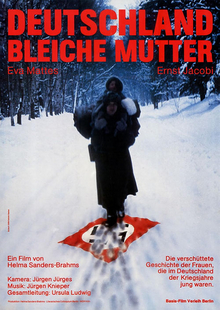Plot
In the 1930s, Hans is attracted to Lene, the only dark-haired one of a German family of seven sisters. As Hans's friend, Ulrich, is a member of the Nazi party, Lene is reluctant to see Hans but, after ascertaining that Hans is not a Nazi, she agrees to see him, and they eventually marry. On Lene's birthday, she learns that Hans has been conscripted to fight in Poland because he is a low-level bureaucrat who is not in the party, while Ulrich has been spared. In Poland, Hans murders civilians and has a hard time adjusting to war, like many other soldiers. When he returns on leave, he and Lene conceive a child, Anna, who is born during an air raid.
After their home is bombed, Lene takes Anna to see Hans, back on a two-day leave. Though Lene is happy to see him, he becomes jealous of Anna and Anna of him. To keep herself and Anna safe from the war, Lene treks on foot across the country. After the war, she is raped by two American soldiers in front of Anna. Eventually heading home, Lene reunites with a sister and, later, Hans. Over time, their reunion unravels as he is continually paranoid that she was unfaithful when he was away. He is also harsh with Anna over her schoolwork, sporadically beating her and constantly criticizing her. After the war, he reunites with Ulrich, who briefly encourages Anna to tease Hans. The teasing breaks Hans' cheerful mood (whose fragility is likely due to post-traumatic stress), leading him to beat Anna to tears.
Depressed, Lene contracts facial paralysis. Hans comes home, happy about his promotion, to discover his wife's condition. He takes her to the doctor, who informs them that all her teeth must be removed to stop the paralysis from spreading. Against her will Hans, noting that life is more important, orders the extraction. This further isolates and depresses Lene whose facial paralysis persists, who takes to her bed, withdraws from Anna, and wears a veil when she has to go out.
Ulrich and Hans maintain good relations, until one night, after they have been drinking, Hans learns Ulrich has been promoted above him. Ulrich justifies it by his qualifications. Hans, embittered by Ulrich's promotions, no longer attracted to Lene, and tired of her depression, does not react when Lene tells him she does not want to live anymore. He leaves for work, and Lene locks herself in the bathroom, intending to gas herself. Anna cries and begs her to come out, and eventually, she does.
